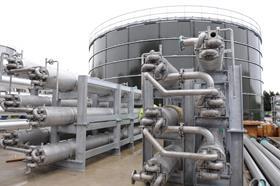
Food waste collections for anaerobic digestion should be rolled out across England to divert waste away fromenvironmentally damaging landfill or incineration,AD industry chief Charlotte Morton has urged.
The chief executive of theAnaerobic Digestion & Bioresources Association (ADBA) described the UK’s AD industry as a huge economic opportunity for the UK ahead of the Autumn Statement, which will be announced on 29 October.
This week she wrote a letter to theexchequer secretary to the Treasury, Robert Jenrick, outlining the economic and environmental benefits of AD – a technology that converts organic waste and purpose-grown crops into renewable heat and power (in the form of biogas), clean transport fuel, and natural fertiliser.
In her letter, Morton urged the government to make food waste collections universal in England, replicating the improvement in food waste recycling rates seen in Scotland, Wales and Northern Ireland as the result of a similar policy.
As well as helping to divert food waste away from landfill or incineration, the National Infrastructure Commission has estimated that introducing universal food waste collections in England would save local authorities up to £400 million in capital costs and £1.1 billion in operational costs between 2020 and 2050.
In her letter to the Treasury, Morton wrote:“With targeted government support for research into our sector, we could supercharge our industry and put it at the cutting edge of agricultural science.
“Developing new waste management technologies would provide a boon to British exports, but also transform the sector’s performance to eliminate the need for further future subsidy.
“The UK AD industry has grown by more than 350 per cent over the last ten years and the UK has established itself as a world leader in biogas, with UK companies already exporting biogas-related expertise and equipment.
“The UK has a real opportunity to be at the heart of the growing global biogas industry, which has the potential to be worth £1 trillion.”
Morton also highlighted how AD can play a central role in new sector deals for agritech – by helping farmers to reduce their emissions – and the growing bioeconomy.
According to ADBA, if it meets its full potential, the UK AD industry could meet 30 per cent of the UK’s household gas or electricity demand and create around 35,000 jobs, as well as improving energy security and soil quality (by producing a nutrient-rich natural fertiliser).
The organisation said the AD industry was hopeful that commitments in the Autumn Statement will prompt a commitment to universal food waste collections and clear incentives for AD in Defra’s forthcoming Resources & Waste Strategy.



